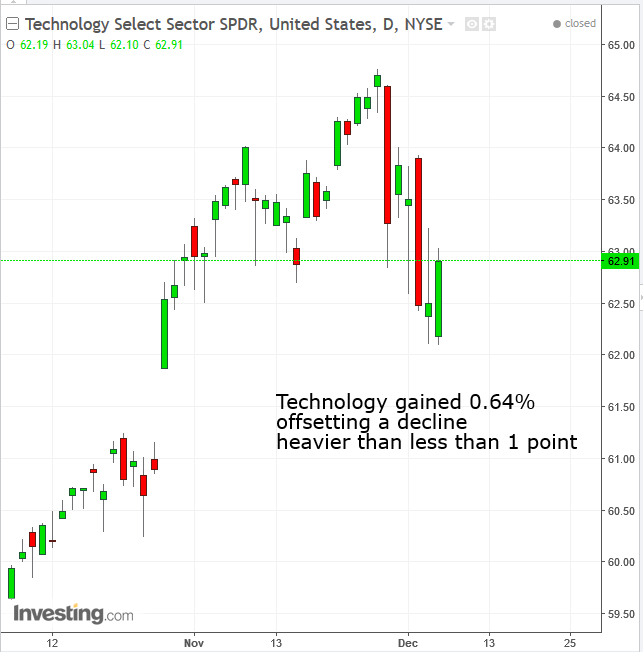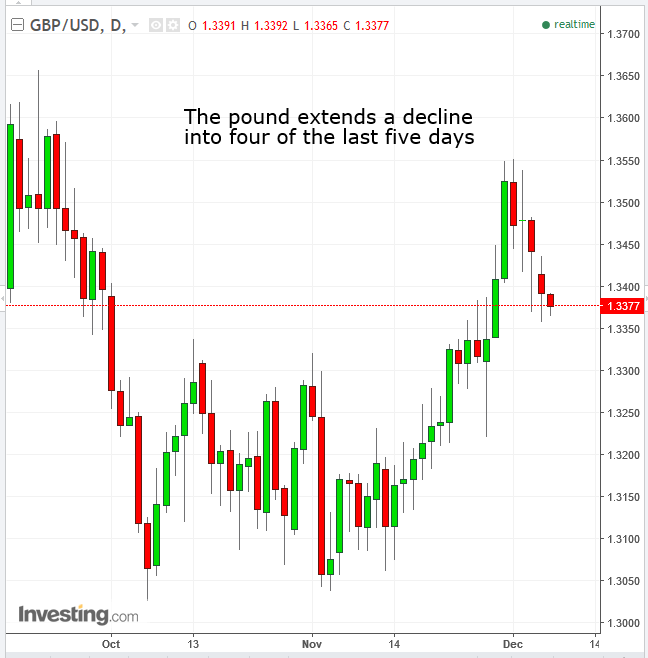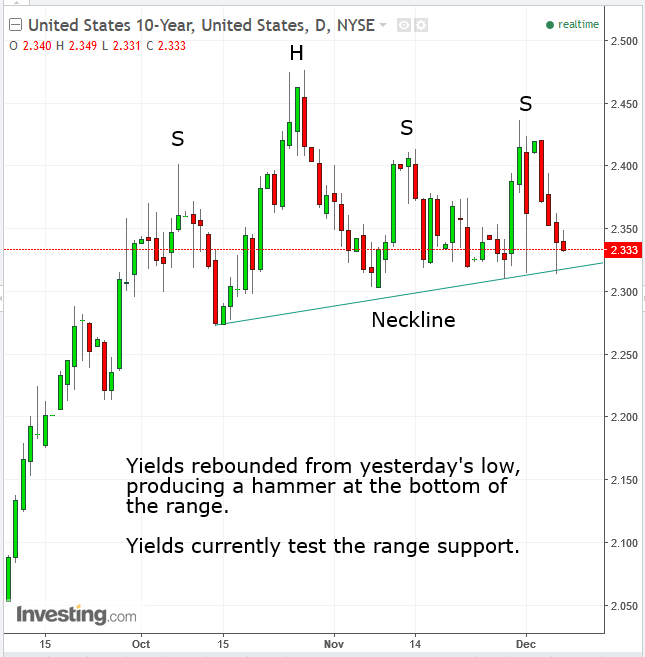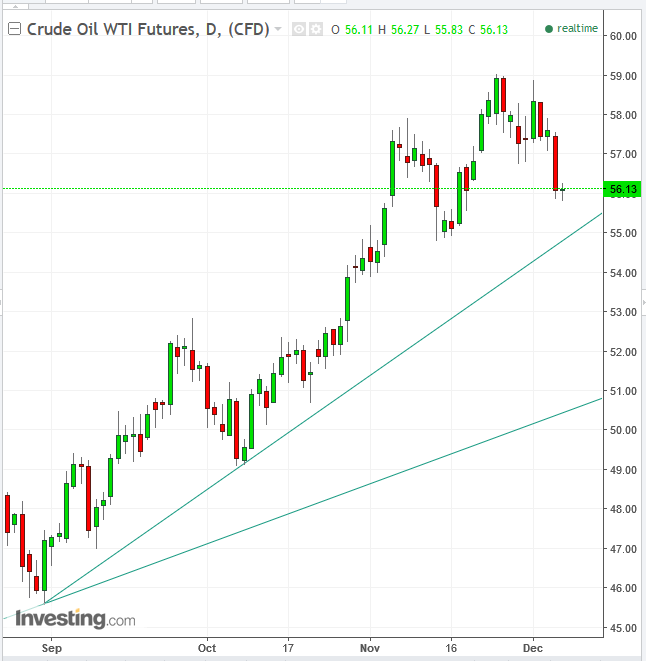Who is Kevin Hassett? Wolfe looks at the Trump ally tipped to become Fed Chair.
by Pinchas Cohen
Key Events
Yesterday, US stocks almost bucked the global sell-off, but not quite. Ironically the Technology sector, which had been responsible for the earlier worldwide sell-off gained in the US—offsetting the slide in Consumer and Financial shares. Though it saw some intraday gains, the S&P 500 still ended lower on the day, albeit by less than a point. Small as the loss was, it nevertheless extended the benchmark index's declines for a fourth day, the longest down-leg since March.
Global Financial Affairs
The current sell-off has spawned the market narrative that investors are rotating out of the technology sector because:
- Tech has come to be viewed as the most expensive sector YTD, gaining 29.22 percent since the beginning of the year, 11.20 percent more than the SPX. (Similarly, emerging market stocks, among this year’s winners after rising almost 37 percent, slumped to a two-month low.)
- Technology stocks provide negative relative value in a post tax reform market, since tech companies won't benefit from the proposed 20 percent corporate tax rate. As it stands they already pay an effective 18.5 percent rate, whereas financials pay a 27.5 percent effective tax rate, making their shares the major beneficiaries, thereby providing the most relative value for investors.
Putting paid to that however: on Tuesday the decline was pervasive and included both defensive and growth stocks. Indeed, that descent was led by Utilities, which fell 1.27 percent. Technology, currently being blamed for the sell-off, was in fact the only sector in the green, even if only because of a 0.03 percent advance.

Yesterday, Technology outperformed again, gaining 0.64 percent. Additionally, Financials—the sector one would presume would move higher on the possibility of tax cuts—fell 0.35 percent even as the benchmark index itself headed lower. Yesterday's decline extended the losses for a fourth day, painting a picture of an overall market correction rather than a benign sector rotation. Our conclusion: this might just be a broader profit-taking effort as we head into the year end.
Stocks in Asia were mixed this morning, easing the overall selling. In Japan, both the Nikkei 225 and TOPIX pared most of yesterday’s losses, while the TOPIX closed above the real body of yesterday’s candle.
In a reversal of recent activity, Hong Kong’s Hang Seng rebounded, while the Shanghai Composite fell. Over the past few days the current sell-off was harder on Hong Kong shares than on mainland equities, after regulations threatened to limit the flow of funds that were responsible for the Hang Seng’s decade highs. Interestingly, no change has been reported on Chinese regulators’ trajectory for limiting the flow of funds but they are actively working to cool down stocks in Hong Kong, according to the Wall Street Journal. The MSCI Asia Pacific Index fell this morning, for an eighth straight day.
In contrast to Asia, European markets picked up steam, eking out a gain after a two day drop. While basic resource stocks extended declines, technology, as in the US, and travel-related equities led the Stoxx Europe 600 in a rebound.
The euro was little changed as investors awaited today's release of economic growth data for the region.

Sterling drifted, ahead of another attempt by the UK government to come up with a proposal that would solve the Irish border impasse now holding up the advance of Brexit negotiations.
The Australian dollar dropped to the lowest since June after October trade data missed estimates.
Core European bonds declined while those on the periphery edged higher as German Industrial Production unexpectedly shrank for a second straight month.

Treasuries, including the benchmark 10-year note, steadied as progress by Republican lawmakers continued toward negotiating a final US tax cut bill, after US sovereign bonds rose yesterday ahead of a potential government shutdown at the end of the week.

West Texas oil traded near $56 a barrel after falling the most in two months on Wednesday as U.S. gasoline stockpiles expanded more than expected. The rising dollar pushed the price of oil down as well.
Up Ahead
- Theresa May will present draft wording in another effort to come up with an acceptable solution to the Irish border as soon as today.
- Euro area GDP in the third quarter is set to be confirmed at 0.6 percent and will likely point to business investment and household consumption as the largest contributors to growth.
Market Moves
Stocks
- The Stoxx Europe 600 Index climbed 0.1 percent as of 8:11 London time (3:18 EDT).
- The U.K.’s FTSE 100 gained 0.1 percent to the highest in more than a week.
- Germany’s DAX jumped 0.2 percent.
- Japan’s Nikkei 225 Stock Average climbed 1.4 percent.
- The MSCI Asia Pacific Index jumped 0.4 percent.
- The MSCI Emerging Markets Index increased less than 0.05 percent.
- S&P 500 Futures advanced 0.1 percent to 2,631.00.
Currencies
- The Dollar Index gained 0.12 percent, blowing out of the formation of a bearish flag, and to the highest in almost two weeks.
- The euro increased less than 0.05 percent to $1.1799.
- The British pound fell 0.1 percent to $1.3373, the weakest in more than a week.
- The Japanese yen decreased 0.2 percent to 112.55 per dollar.
Bonds
- The yield on 10-year Treasuries dipped less than one basis point to 2.34 percent, the lowest in more than a week.
- Germany’s 10-year yield advanced less than one basis point to 0.30 percent.
- Britain’s 10-year yield climbed one basis point to 1.234 percent.
- Japan’s 10-year yield gained less than one basis point to 0.057 percent, the highest in five weeks.
Commodities
